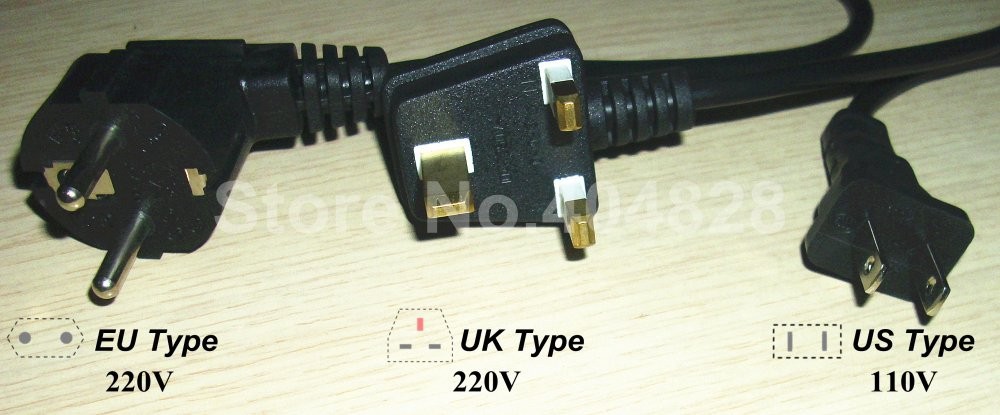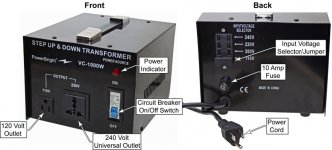You are using an out of date browser. It may not display this or other websites correctly.
You should upgrade or use an alternative browser.
You should upgrade or use an alternative browser.
Converting a UK tool to US 110
- Thread starter NHSP759
- Start date
Holmz
Member
- Joined
- Oct 11, 2014
- Messages
- 4,001
Is it is a 2 pronged Eu style or the UK?

If it is 220/230v then that implies that it will not work on 110v. So you need 220v.
The easiest way is a UK plug (extension cord) with an US male (220v dryer plug) end attached.
1) Plug the FT into the UK female end.
2) Plug the US Male end into the wall.
One could also also put the US Dryer plug right onto the FT's lead.
Or you could put a new cord on starting inside and put the US plug on the end.
I have not dug into the FT gear, but many similar tools have only 2 wires in the device.
Clearly it is the case with the Eu 230v, but I do not know how the UK is wired.
You may want to consider an electrician if you are not versed in electricity, as the voltages are considered dangerous.

If it is 220/230v then that implies that it will not work on 110v. So you need 220v.
The easiest way is a UK plug (extension cord) with an US male (220v dryer plug) end attached.
1) Plug the FT into the UK female end.
2) Plug the US Male end into the wall.
One could also also put the US Dryer plug right onto the FT's lead.
Or you could put a new cord on starting inside and put the US plug on the end.
I have not dug into the FT gear, but many similar tools have only 2 wires in the device.
Clearly it is the case with the Eu 230v, but I do not know how the UK is wired.
You may want to consider an electrician if you are not versed in electricity, as the voltages are considered dangerous.
Holmz
Member
- Joined
- Oct 11, 2014
- Messages
- 4,001
Depends where "over here is"?
You havetwo three basic choices:
Is "over here" in a shop or everywhere, as in portable?
1) This is the easiest, and it is portable.
http://timberwolftools.com/tools/protool/converter.html
2) For a shop you may want an Eu or UK wall outlet.
3) The extension cord method.
I would suggest you:
1) ... either stick to Eu or UK plugs, unless the power converter does both Eu and UK. Personally I see no great advantage in the UK 220v, as most of the tools are probably available from the fatherland anyhow.
2) ... or call Timberwolf to see what the power converter supports (UK/Eu).
However once you have taken the plunge to 220v it opens up all lot of options, and mitigates NAINA.
You have
Is "over here" in a shop or everywhere, as in portable?
1) This is the easiest, and it is portable.
http://timberwolftools.com/tools/protool/converter.html
2) For a shop you may want an Eu or UK wall outlet.
3) The extension cord method.
I would suggest you:
1) ... either stick to Eu or UK plugs, unless the power converter does both Eu and UK. Personally I see no great advantage in the UK 220v, as most of the tools are probably available from the fatherland anyhow.
2) ... or call Timberwolf to see what the power converter supports (UK/Eu).
However once you have taken the plunge to 220v it opens up all lot of options, and mitigates NAINA.
AlexThePalex
Member
- Joined
- Nov 12, 2008
- Messages
- 7,808
ChrisK1970 said:So.....anybody have any idea if I can convert a UK 220 Festool hard wired jig saw for US standard 110v?
Not possible. The talk above about plugs is moot because you need an entirely different motor inside the saw.
Only way to use your saw is with a 110 to 220 volt transformer.
NHSP759
Member
- Joined
- Dec 28, 2013
- Messages
- 579
Well that's too bad! I got it as a cool piece for my shop wall and then I was like.....hmmm, I'd like to give it a whirl. So that really is a bummer. Pretty cool having a Festo Jig sitting under my Freud shop light but kinda sad too.Alex said:ChrisK1970 said:So.....anybody have any idea if I can convert a UK 220 Festool hard wired jig saw for US standard 110v?
Not possible. The talk above about plugs is moot because you need an entirely different motor inside the saw.
Only way to use your saw is with a 110 to 220 volt transformer.
Thanks guys for the help!
ccarrolladams
Member
- Joined
- Apr 14, 2010
- Messages
- 1,451
Virtually everywhere in the USA 220v 1ph AC is supplied to residential and commercial customers.
You need to install 220v receptacles. However, the Uniform Electrical Code prohibits installing non-listed receptacles, such as those used in Europe or the UK.
Nearly all Festools run on both 50 and 60 hz.
If you are in business, be sure to carefully check the Safety Orders of your state, because generally those safety orders prohibit use of hand-held 220v tools in the USA. By the way, using a 110v to 220v step-up transformer will also violate virtually all workplace electrical safety orders. Asking an employee to use a hand-held tool running on 220v nearly always will violate your workers comp insurance policy and can result in criminal prosecution in extreme cases.
You need to install 220v receptacles. However, the Uniform Electrical Code prohibits installing non-listed receptacles, such as those used in Europe or the UK.
Nearly all Festools run on both 50 and 60 hz.
If you are in business, be sure to carefully check the Safety Orders of your state, because generally those safety orders prohibit use of hand-held 220v tools in the USA. By the way, using a 110v to 220v step-up transformer will also violate virtually all workplace electrical safety orders. Asking an employee to use a hand-held tool running on 220v nearly always will violate your workers comp insurance policy and can result in criminal prosecution in extreme cases.
- Joined
- Jan 22, 2007
- Messages
- 1,641
I was about to post separately, but since you touched on several issues, I'll use your quotes for intro:
Correct. It shouldn't be a dryer plug as a previous poster suggested, though. It should be a NEMA 6-15 plug and receptacle. As long as it is a modern tool, it will be double-insulated and does not utilize the ground wire (2-wire connection). However, if it currently utilizes a ground, then the new plug should also include a ground.
While this is correct, European connectors are in fact "Listed" under IEC, and are therefore technically permitted. The NEC does not specify which agency listing is required, just that they be listed.
I hadn't considered this, but I do believe you are correct. I wouldn't lose sleep over it, but it should be reviewed if the tool is used in a commercial environment.
Your (the OP's) other alternative is to use a buck-boost transformer. These are readily available and I have one specifically for testing out European tools. Most of them will even come with receptacle outlets that will already accept the existing European plugs.
[attachimg=1]
ccarrolladams said:Virtually everywhere in the USA 220v 1ph AC is supplied to residential and commercial customers.
You need to install 220v receptacles.
Correct. It shouldn't be a dryer plug as a previous poster suggested, though. It should be a NEMA 6-15 plug and receptacle. As long as it is a modern tool, it will be double-insulated and does not utilize the ground wire (2-wire connection). However, if it currently utilizes a ground, then the new plug should also include a ground.
ccarrolladams said:However, the Uniform Electrical Code prohibits installing non-listed receptacles, such as those used in Europe or the UK.
While this is correct, European connectors are in fact "Listed" under IEC, and are therefore technically permitted. The NEC does not specify which agency listing is required, just that they be listed.
ccarrolladams said:If you are in business, be sure to carefully check the Safety Orders of your state, because generally those safety orders prohibit use of hand-held 220v tools in the USA.
I hadn't considered this, but I do believe you are correct. I wouldn't lose sleep over it, but it should be reviewed if the tool is used in a commercial environment.
Your (the OP's) other alternative is to use a buck-boost transformer. These are readily available and I have one specifically for testing out European tools. Most of them will even come with receptacle outlets that will already accept the existing European plugs.
[attachimg=1]
Attachments
Holmz
Member
- Joined
- Oct 11, 2014
- Messages
- 4,001
The fact that those transformers are available and sold indicates that they comply with some standards, which is why I listed it as option #1 in my later post.
My DX700 from Italy had an Eu plug. As Australia is on 240v I only needed to by the plug it cord locally.
My DX700 from Italy had an Eu plug. As Australia is on 240v I only needed to by the plug it cord locally.
ccarrolladams
Member
- Joined
- Apr 14, 2010
- Messages
- 1,451
Holmz said:The fact that those transformers are available and sold indicates that they comply with some standards, which is why I listed it as option #1 in my later post.
My DX700 from Italy had an Eu plug. As Australia is on 240v I only needed to by the plug it cord locally.
Please understand that Electrical Codes and Safety Regulations vary widely from place to place.
My reply deals with the USA. As Rick C stated IEC lists most European and UK connectors. However, many local electrical codes do not accept IEC listing, so when it comes to an electrical permit inspection this could be an issue.
The fact that a particular transformer is sold hardly means using it under workers comp regulations is permitted. Be sure to check with your local regulators.
Similar threads
- Replies
- 11
- Views
- 919
- Replies
- 9
- Views
- 7K
- Replies
- 1
- Views
- 213
- Replies
- 18
- Views
- 1K

